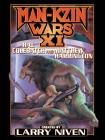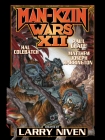Man-Kzin Wars XI by Hal Colbatch (ereader manga txt) 📗

- Author: Hal Colbatch
Book online «Man-Kzin Wars XI by Hal Colbatch (ereader manga txt) 📗». Author Hal Colbatch
The assault boat was closing the gap at three thousand miles per second when it finally got close enough to throw on a gravity yoke. The boat's radiator blossom instantly turned sheer white. Cockroach's gamma cannon was detected starting up, but this was deemed of far less concern than the heat-exchange situation: hitting at this range would have required a miracle, and not a small one. Humans simply weren't that good.
They were notoriously demented. This one was no exception. The human ship wasn't on an atmosphere-skimming path, it was aimed for the center of the disk. By the time their velocities were matched, slowing the pursuer and speeding up the prey, no further effort could be spared to bring them together yet, as the boat was engaged in hauling them both aside to save the human ship's crew.
Cockroach, aboard which Peace Corben had finished having conniptions hours ago, fired its gamma laser into Lucifer's atmosphere and went immediately into stasis. The shot heated a large volume to electrons and stripped nuclei, but did not suffice to ignite fusion. It took the impact, a few milliseconds later, of the relativistic byproducts of the gamma-generating blast to do that. The atmospheric fusion blast was brief, and didn't do much more than UV-ionize a tremendous volume of hydrogen around it, which expanded until it was cool enough to recombine. This created, then uncreated, a discontinuity about the size of Earth's Moon in Lucifer's magnetic field.
When the electromagnetic pulse hit the assault boat, the superconductive pulse shielding expanded by internal repulsion until hull members tore it apart; then the overloaded gravity planer collapsed the boat to a point, which evaporated in Hawking radiation at once. The blast was seen on Pleasance.
It was followed by the flare of Lucifer, in visible light, as Cockroach plowed into the contracting remains of the atmospheric fireball. The ship's fuel intakes were in stasis, as were the tanks themselves, and the local material was now heavily enriched in deuterium; when inertial sensors in the instrument bubbles detected a halt, indicating that the ship was as deep as it was going to get, the field on the tank intakes was flickered for just long enough for the pressure to slam them shut. The tanks' contents would be cooled and separated when things were less exciting.
* * *
A destroyer had set out immediately after the destruction of the flagship, had refused to acknowledge transmissions, and had been declared outlaw—largely as a matter of form, as its intentions were obvious. Gnyr-Captain and his crew wouldn't have cared if they weren't. They had sworn personal fealty to Hthht'-Riit, and considered their own lives to be over. All that remained was to finish dying, and they would do it like kzinti.
They were still two hours from Lucifer when the human ship recoiled out of the atmosphere. Much of it came out of stasis, and the ship presently stopped tumbling. It cast about as if purblind (which it was, as three of the four instrument packages were now condensing metal vapor inside their shells), picked a direction, and shot away at six hundred gees.
The outlaw destroyer could not spare the time for much of a ceremony: a minute or so to contemplate the ship's new name. This was less precisely transliteratable into a human language than most kzinti concepts, as it was less a word than an expression of feeling, sounding like some primordial red scream. It did have a meaning as a noun—it was the title of an ancient (pre-industrial!) mythical being, whom the gods sent to punish cannibals and those who claimed Names they had not earned. According to legend, the creature had been a kzin who had contradicted some god, and had been flayed alive and boiled in vinegar—but only after being made immortal, so he couldn't escape by dying. After torture he stuck to his assertions, so impressing the ruler of the gods with his courage and principles that they made him their instrument, granting him perfection of movement in battle.
It may or may not have been a coincidence of etymology that led the ancient Greeks to give the name Eumenides, "perfect in grace," to three figures of similar function, more properly known as Erinyes. The Romans, however, gave them the name by which they were most familiarly known.
The Fury continued its pursuit.
* * *
Peace Corben knew nothing of this. The ship's computer hadn't noticed the destroyer, and hadn't been informative with her anyway. She did finally manage to get out of it the origin of the name Cockroach: it was an ugly little Earth insect, notorious for its ubiquity and its capacity to survive attempts to kill it. It didn't please her to be in a vessel with such a name, particularly one that acted like this one did.
Peace would have been less pleased, if that were possible, to learn that the things were extinct.
II
Peace had been offplanet about twenty standard years back, to the research base orbiting Amethyst (which star still obstinately kept secret its reason for being a brilliant shade of theoretically-impossible purple). Supposedly she was there to gather material for her sociobiology dissertation on isolated communities; in fact, she was a rich kid playing tourist, and the staff had promptly put her to work programming the kitchen—which she became so unexpectedly good at (she'd never done it before) that the base autodoc had to constantly fiddle with everybody's thyroids to keep their weight down. She'd never been in hyperspace, though. Naturally she'd heard about its peculiarities, but now she still didn't get to experience them. A viewscreen will not display the Blind Spot. Consequently it wasn't the eerie experience she'd been expecting.
As the ship was





Comments (0)